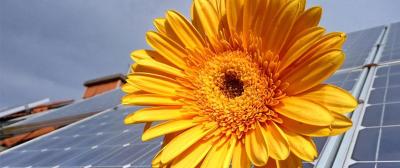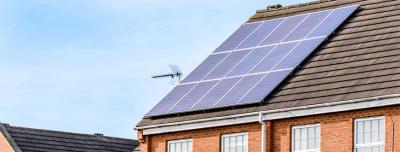Solar Panel Payback Time

Solar panels are at their cheapest price since 2010, so even though they're still a large investment, the solar panel payback time could be shorter than ever.
You’ll see this payback through reduced electricity bills and possibly even as payments through the Smart Export Guarantee or Renewable Heat Incentive. So if you were wondering whether solar panels are still worth it since the closure of the Feed-in Tariff, they most certainly are.
How much do solar panels cost?
Before looking at solar payback time, we need to know how much is being invested. For the average UK home, solar panels will cost £6,000 – £7,000, about 60% cheaper than in 2010. So, despite the Feed-in Tariff (FiT) coming to an end, solar payback time could still be shorter than if you installed solar panels a few years ago.
The size of your home and the demand for electricity will determine the size of solar panel system you'll need and will ultimately have an impact on the total price.
| Size of Solar Panel System | Average Price |
| 1kW | £1,840 |
| 2kW | £3,680 |
| 3kW | £5,520 |
| 4kW | £6,040 |
To give the systems a bit of context, a 3 bedroom house is likely to need a 3-4kW system, coming to a cost of around £5,520 – £6,040.
As you can see, solar panels are a considerable investment. So, to find the most competitive installation price, we highly recommend comparing at least 4 quotes. To make finding local solar installers a simple process, you can get free quotes right here on Solar Guide.
Solar panel payback time UK
To help give you an idea of how long solar panel payback time could be, we've used our solar payback calculator, a tool that works out your specific solar payback time using certain criteria.
Solar panel payback time in the south of the UK
In this case, we've worked out the solar payback time of a property in London installing a 3kW solar system, as well as the following over a 20 year period:
- Daytime electricity rate of £0.1437 per kWh
- No export meter
- Panel degradation to 80% of year 1 output over 30 years
- Retrofit to an existing building (band D or above)
| Potential Solar Payback Time in London (3kW system) | |
| Solar Panel Investment | £4,834.83 |
| 1st Year Electricity Savings | £187.13 |
| Payback Time | 11 years and 4 months |
| Total profit over 20 years | £952.26 |
Solar panel payback time in the north of the UK
Using the same set of criteria as above but with a south facing roof in Glasgow, a profit from solar panels can also be made over the course of 20 years in Scotland too.
| Potential Solar Payback Time in Glasgow (3kW system) | |
| Solar Panel Investment | £4,834.83 |
| 1st Year Electricity Savings | £167.43 |
| Payback Time | 12 years and 5 months |
| Total profit over 20 years | £230.93 |
This is without any government payments schemes being factored in such as the Feed-in Tariff (ended March 2019) and the Renewable Heat Incentive (eligibility with solar thermal only).
If you had your solar panels installed before the Feed-in Tariff closed in March 2019, then you'll still receive payments and will have a shorter solar payback time as a result.
How to shorten solar payback time
As we’ve seen, it’s possible to see a return on your investment in solar thanks, in whole, to the savings being made on your electricity bills. To reduce solar payback time even further, you could also be eligible for government-backed schemes. These include the Smart Export Guarantee (solar PV) and the Renewable Heat Incentive (solar thermal).
Smart Export Guarantee
In the UK, we receive, on average, around 1,493 hours of daylight over the course of a year (source: Current Results). If we break that down, that’s around 4 hours per day. Using this number, we can work out how much you could potentially earn through the SEG per year.
Let’s say you get the highest tariff, which stands at 5.6p/kWh (correct as of January 2021). With 4 245 watt solar panels, you’d be generating around 3,920 kilowatts of electricity per 4 hours of daylight. That’s 3.9 kWh, which equates to a little over 22p per day. Over a year, you’ll potentially be earning £80.30 which is £1,606 over the course of 20 years.
Should you need a more powerful 4 kW system, with 10 400 W solar panels, you’d earn more through the Smart Export Guarantee. Your earnings could reach a potential £3,207 over 20 years. Remember that you would be making a larger initial investment.
Compare Smart Export Guarantee Tariffs
Renewable Heat Incentive
Under the Renewable Heat Incentive, those eligible can earn government payments for the heat being generated by their renewable heating system. When it comes to solar, this means installing a solar thermal system, which uses energy from the sun to heat the water for the central heating system as well as for the hot water taps.
Further your investment with a solar battery
By adding a solar battery to your solar panel system, you will be able to store up excess solar energy generated during the day (there's likely to be quite a bit) to use after the sun sets. This will increase your energy bill savings further because without a solar battery, all the energy used during the night will be provided by the energy supplier.
Solar batteries do come at a price though, somewhere between £500 to £8,000 depending on the make and model.
Get free solar battery quotes.
Get free solar quotes
To help get your solar panel installation off to the best possible start, complete our simple online form and you'll get free solar panel installation quotes from up to 4 solar installers in your local area.
Getting multiple quotes gives you the greatest chance of finding the best possible deal, helping you to save money and time on the installation.
Find local, MSC certified Solar Installers
Start your quote
Find local, MSC certified Solar Installers














